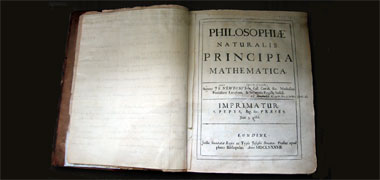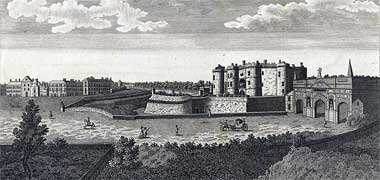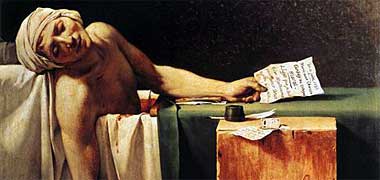
a collection of notes on areas of personal interest
- The Cassini and Maraldi families
- Cassini family history
- Giovanni Domenico Cassini
- Jacques Cassini
- César François Cassini
- Jean Dominique Cassini
- Alexandre H G Cassini
- Maraldi family
- Giacomo Filippo Maraldi
- Giovanni Domenico Maraldi
- Giovanni Filippo Maraldi
- Giacomo Francisco Filippo Maraldi
- Astronomy
- Cartography
- The Babaud & Masson families
- The Age of Enlightenment
- Cassini and Maraldi references
Enlightenment, revolution, war and romanticism – a brief background

The reason I am adding a note to the Cassini pages is that, if my experience is anything to go by, little is taught in Britain of European history and some of its important characteristics and effects. European history of this period is extremely complex and I hope I don’t mislead anybody in attempting to simplify it here. One of the most significant elements of this period relates to what is known as the ‘Age of Enlightenment’ or the ‘Age of Reason’ which introduced considerable changes in Europe and north America. It is against this background that the Cassinis and their related families carried out some of their most significant work – and which also affected those families in the turbulence of the eighteenth century.
Chronologically the ‘Age of Enlightenment’ lasted from approximately 1740 to 1780 - its apogee being the 1770s and 1780s – and events at this time and following were based on the principles thought to have been established by the Enlightenment. The French Revolution and Napoleon’s regime can be thought to have found their focus in its moral appeal, but were also central to the change of focus from Enlightenment to Romanticism. But let us first go back a little…
Humanism and cultural relativism
The humanism of the fourteenth and fifteenth centuries had developed the views of ancient societies as a method for bringing about change. In this they established a countervailing perspective for man and his relationship with God from that promoted by the Church, one which was more acceptable and one which enabled and reinforced artistic and scientific discovery, both bringing individuals into conflict not just with the Church but also with the Inquisition.
Humanism was developed in the sixteenth century by cultural relativism, a movement suggesting a less dogmatic approach to other cultures, and which ultimately formed a focus for the Enlightenment in establishing the need or ability to examine everything without being bound by previous preconceptions – whatever their basis and provenance. All this has to be seen against the background of warfare and territorial expansion, repression by State and Church, and the constraining of artistic and scientific licence. This process continued through the seventeenth century with absolute monarchs claiming divine right to rule, and the Church divine right to impose its will based on close readings of the Bible.
Eighteenth century France
France, at the beginning of the Cassini era, was governed by a priviledged nobility, as it had been for centuries. Both social status and political influence were governed by birth, most of the King’s ministers, provincial governors and bishops being noblemen. But the bourgeoisie and peasants were both becoming increasingly aware that the taxes they were paying were becoming a greater burden for them, and that while the nobility, Court and Church benefited, their own condition was deteriorating.
In the seventeenth and eighteenth centuries, France was neither a cohesive nor coherent structure. Most of its inhabitants did not speak French, nor would they have understood the concept of being ‘French’. French, the official language, was spoken mainly by the small élite, not all of whom could write it, and dialects were spoken overwhelmingly around the country, as they were in the territories immediately adjacent to it. To a great extent the France that emerged politically was bounded by natural barriers, except in the north-east. But the rest of the country was peopled by dialect-speaking inhabitants who mostly travelled no great distances, and had little understanding or interest in what happened relatively close to them. Their chief interest was focussed on deriving a living from the land, and their main concerns had to do with the payment of increasing taxes, and fear for those things of which they had no understanding, natural or man-made. Four-fifths of the population lived in rural communes and travellers noted that, despite this proportion, there was nobody to be seen in the country through which they passed. Towns were insular and would be closed at night.
It was against this background that the Cassini and Maraldi families became significant figures in French scientific circles from the middle of the seventeenth to the turn of the nineteenth centuries. In their professional work covering five generations they liaised and corresponded with a number of scientists in other countries, and they would have been aware of the political and, to some extent, socio-cultural context in which their work was developing. For they themselves benefited through social advancement, though this was later to redound against them.

One of the most important precursors of the Enlightenment was the work carried out by Sir Isaac Newton in England who, in arguing that a series of laws underpinned natural phenomena, established a basis of rigorous intellectual enquiry which, in applying scientific examination to the natural world, was extended to form an intellectual rationale for the Enlightenment. Jacques Cassini, the son of Giovanni Dominicus (who became Jean Dominique), met and corresponded not only with Newton but also Flamsteed, Halley and others and, in his work in cartography and astronomy, was a part of this move to rationalisation. This rigorous approach characterised scientific work of this period, subsequent members of the Cassini family continuing to work within this intellectual climate.
The engineering of Giovanni Dominicus Cassini’s move to Paris was organised by the Abbé Picard and Jean Baptiste Colbert, the King’s Comptroller of Finances, and ostensibly had much to do with improving the capabilities of the Observatoire in Paris. But, in his cartographic work, there would have been a significant attraction to the King in developing a precise understanding of the lands held by the nobility and, by extension, the taxes to be derived from them at a time when funds were being rapidly depleted by the excesses and lifestyles of the nobility and Court together with adventures in territorial expansion. One result was that the King learned France was a little larger than had been previously thought. There was also a compelling need to have good maps to support the military and its operations.
The King took considerable interest in cartographic and astronomic work both as subjects in themselves as well as in their possible usefulness. Consequently, Giovanni Dominicus Cassini didn’t return to Italy but became so settled in his work that he married into a noble family, changing his name to Jean Dominique Cassini. He was now part of the nobility, though admittedly by marriage. Nevertheless he and his family had become a part of the system hated by so many and some, such as Angélique Dorothée Cassini, two generations later the wife of Dominque Joseph Cassini, and her half-brother, Alexandre Frédéric Jacques Masson, were significantly bound up in the intrigues of the Court. Dominique Joseph became an officer of the French military, through whom he benefited from knowing the Prince de Condé, while Alexandre was close to the Duke de Maillebois. The Cassinis were, then, both important in progressing the Enlightenment, as well as being part of the increasingly hated establishment.
Seeds of revolution
However, France was by now in debt as increasing taxation had not been able to pay for the Court’s excesses together with the expenditures on the Seven Years’ War – 1756-1763, and the American War of Independence – 1775-1783, where France supported revolution against its traditional enemy, Great Britain. Successive attempts to control expenditures were thwarted by intrigue and incompetence, the necessary legal and administrative structures being unable to deal effectively with the problem.

So, the middle of the eighteenth century saw increasing difficulties for France. Its industrial revolution, urbanisation and the movement of peasants away from their land, together with significant crop failures and a concomitant rise in the price of grain and bread set the basis for disenchantment, while the initiatives produced by the Enlightenment, particularly in promoting the ideologies of equality and the freedom of the individual, also created the setting for the bourgoisie to demand the end of monarchy and the introduction of legislative bodies to run the country. The failure of the crops in 1788 followed by a severe winter appeared to trigger insurrection at Grenoble, which was put down by the military. But these factors produced a momentum which resulted in the storming of the Bastille in 1789 and a full, national revolution.
Romanticism, war and Napoleon
The period from the end of the eighteenth century to about 1820 saw the beginnings of Romanticism and its conflict with the Enlightenment creating a turbulence throughout Europe. The Revolution is considered to be the turning point in France for the move towards Romanticism, as the opportunities for intellectual, cultural and personal change developed individual and national expectations. More particularly, Romanticism was a revolt against the lack of individuality created by the rationality of the Enlightenment; it empowered individuals to express themselves, to move away from conformity and embrace diversity. One of the reasons for its success was its ability to expand within the cultural vacuum created by the Revolution.

Those responsible for the Revolution themselves suffered at its hands as the result of struggles between the bourgoisie and proletariat in the fluidity of the new realities. Relationships and institutions changed; Cassini IV was imprisoned by the Revolution between February and August 1794 and, four years later, moved out of Paris to live out the rest of his life as a country gentleman as there was no easy way for him to continue his scientific work. Dominique Joseph Cassini’s estates were also confiscated by the Revolution on his death in 1792.
France not only had its internal difficulties but, in April 1792, declared war on Leopold II of Austria who was supporting military activities within France’s eastern borders. France moved into the Austrian Netherlands, now Belgium. Prussia joined the war against France in August but, by the end of the year, initial advantages were overturned by the French. The King was tried and executed, an event which revolted many and brought together Britain, Holland, Spain, Russia, Sardinia, Naples, Portugal, Prussia and Austria in an alliance against France.

These were interesting times with intrigues and alliances moving rapidly. The British were involved in attempting to destablise France both from within and externally in supporting foreign interests, many British soldiers serving in these armies. Royalists attempted a coup in October 1795 but this was put down by Napoleon who then moved to Italy and assumed command of the French army in Italy, and where he paid tribute to the Cassinis and their contribution to the development of science in France by staying a night in the house where Giovanni Dominicus Cassini was born in Perinaldo. By the end of 1799 Napoleon was made First Consul, consolidating this five years later with his coronation as Emperor.
Despite Napoleon’s respect for the work of members of the Cassini family, some of them intrigued against him. For instance Mme de Cassini, the wife of Dominique Joseph Cassini and mistress of the Prince de Condé met and corresponded with William Windham, and perhaps also had dealings with William Wickham the British spymaster who oversaw operations in Switzerland, south Germany and France, particularly Normandy and Picardy.
It is not a surprise that Alexandre Henri Gabriel, Vicomte de Cassini – Cassini V – led a much less visible life as a botanist, though I don’t know if this was by design or not. Although the Cassini family line continued until his death in 1832, they were no longer involved in the areas in which the previous four generations had made their mark, cartography and astronomy. His only, younger, brother, Alexis Jean Dominique Cassini, died in battle in 1809 at the Battle of Braga in the Napoleonic campaigns of the Peninsula War.
more to be written…
The Babaud & Masson families | top | Cassini and Maraldi references
- The Cassini and Maraldi families
- Cassini family history
- Giovanni Domenico Cassini
- Jacques Cassini
- César François Cassini
- Jean Dominique Cassini
- Alexandre H G Cassini
- Maraldi family
- Giacomo Filippo Maraldi
- Giovanni Domenico Maraldi
- Giovanni Filippo Maraldi
- Giacomo Francisco Filippo Maraldi
- Astronomy
- Cartography
- The Babaud & Masson families
- The Age of Enlightenment
- Cassini and Maraldi references